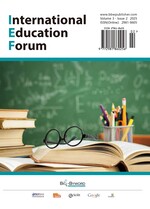Abstract
In the context of the rapid development of new productive forces, the industry-education integration model in vocational education faces adaptive issues such as a mismatch of talent supply and demand, lack of coordination mechanisms, and lagging service systems. Based on the perspective of lifelong learning, this study analyzes the connotation of industry-education integration in a broad sense and constructs a three-dimensional optimization path of “time-space-technology.” In the time dimension, it connects academic education with continuing education. In the spatial dimension, it integrates formal and informal learning environments. In the technical dimension, it promotes the collaborative development of digital technology and digitization, forming an industry-education integration ecosystem that covers the entire career cycle.
References
UNESCO International Commission on the Development of Education, 1996, Learning to Be: The World of Education Today and Tomorrow. Education Science Press, Beijing.
Ma ZY, Pan FQ, 2024, The Role Orientation, Task Orientation, and Action Strategies of Universities Serving Lifelong Learning for All. Continuing Education Research, 2024(12): 9–14.
Xie DL, 2024, The Talent Training Model of Universities under New Productive Forces: Connotation, Formation Logic, and Practical Orientation. Military Higher Education Research, 47(3): 50–57.
Geng LL, Zhang M, 2024, The Dilemma and Breakthrough of the Integration of Production and Education in “Double First-Class’ Construction Universities”. Chongqing Higher Education Research, 2024(10): 1–15.
Bai YX, Wang H, Wang J, 2022, The Current Situation, Problems, and Countermeasures of the Reform of Integration of Production and Education in China — Based on the Analysis of 103 Typical Cases. China Higher Education Research, 2022(9): 88–94.
Xu Y, Shao ZB, 2024, Research on the Construction of Vocational Education and Production Integration Consortium Based on Loose Coupling Theory. Educational Development Research, 44(1): 49–57.
Su H, Xiang MD, 2022, The Connotation, Challenges, and Paths of Deepening the Integration of Production and Education in Vocational Education from the Perspective of “Double Circulation”. Vocational and Technical Education, 43(10): 41–46.
Hu XT, 2020, Time-Space-Technology: Development and Analysis of the Theoretical Framework of Lifelong Learning. Lifelong Education Research, 31(3): 11.
Middleton S, 2016, Henri Febrile and Education: Space, History, Theory. Routledge, London.
